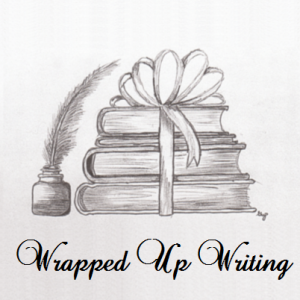Hey guys!!! A fellow reader-turned-editor (she went to school for this stuff – she has a B.A. in English!!) wrote us a cool, quick reference guide for those who are writing a book, and need some guidance. I thought it would be perfect to post here, since I know a few in our crew are actually authors too (some still writing for fun, and some about to release something!!). 😉 *squeeee*
Maybe this’ll help!
How-to Get Your Book Ready for the Editor
By: Tamara Beard
 As an editor, it is my passion to help authors publish the best possible version of their book. That is why the tagline of my editing business, Wrapped Up Writing, is, “Putting the finishing touches on your creative gift.” I don’t create the story, the world, or the characters, but I use my skills and abilities to make sure that the story is grammatically and stylistically correct, the world is believable and appropriately built to fit the plot, and the characters are fully developed. While editing is one of the most important steps that your book should go through prior to publication, there are some steps you can take beforehand to make your life, and your editor’s job, a little easier.
As an editor, it is my passion to help authors publish the best possible version of their book. That is why the tagline of my editing business, Wrapped Up Writing, is, “Putting the finishing touches on your creative gift.” I don’t create the story, the world, or the characters, but I use my skills and abilities to make sure that the story is grammatically and stylistically correct, the world is believable and appropriately built to fit the plot, and the characters are fully developed. While editing is one of the most important steps that your book should go through prior to publication, there are some steps you can take beforehand to make your life, and your editor’s job, a little easier.
1) Finish your book: While some developmental editors will work with you as you write your book, such a feat is usually best reserved for writing coaches. Most editors do their best work with the entire book laid out in front of them. This way, they are better equipped to find spelling inconsistencies, redundancies, plot holes, and other structural issues. Hiring an editor after your book is complete is also beneficial for you, because it prevents you from spending additional money later on when the remainder of your book would need to be edited.
2) Read your manuscript: You’ve been hard at work on your story for months, maybe even years, and you have finally finished it. Be proud of yourself! Step away for a little while and celebrate your success. However, before sending your manuscript to an editor, read over it from start to finish. Even if you don’t believe you are good at proofreading your own work, the 3 a.m. writing mistakes or scenes written with one too many glasses of wine will stand out to you as you read over your work. Read it out loud to find awkward phrasing, use spell check for glaringly obvious mistakes, and use your inner-reader’s perspective for insight into your character development and world building. Once you’ve taken some time to really proofread your work, you will be able to submit it to your editor with more confidence and peace of mind. In fact, you might even save yourself some money, because some editors charge extra for work that has obviously not been proofread by the author. In other cases, editors will give authors discounts when they know that an author is diligent during their pre-editing proofreading process.
3) Use alpha readers: An alpha reader is a person that looks at your manuscript before it is edited and gives you honest, constructive advice to improve your story. An alpha reader can be a critique partner, another author, a trusted family member or friend, or a reader. Whoever you decide to use, they should know enough about your work and the genre it is categorized under to give you detailed feedback about a variety of issues, from character development to sentence structure. While their role may sound similar to that of an editor, they are distinctly different. Alpha readers help you see your work from a reader’s point of view. They read it the same way they would read a book from the library, and then give you feedback about what they liked, what they hated, what seemed strong, and what needed to be worked on. An editor’s job is much more thorough, in-depth, and meticulous to ensure that your work is as polished as possible. Using an alpha reader prior to an editor is extremely beneficial for both parties. It helps you as an author resolve any major story or plot issues, thus reducing the chance of numerous rounds of edits later on. Furthermore, it helps the editor see the full scope of your story and the direction you intend for it to take. This will ultimately help the editor best meet your needs.
If you try your best to accomplish these steps prior to submitting your manuscript to an editor, then the editing process will be much smoother and more pleasant for all parties involved. Happy writing, and don’t ever hesitate to contact me with any questions about editing and how it falls into your creative process!

About the Author: Tamara Beard is the owner of Wrapped Up Writing, a business that provides editing, proofreading, and content writing services. She has a Bachelor of Arts in English, with a writing concentration and communications minor, from the University of Tennessee at Martin. She currently lives in Nashville and enjoys reading, traveling, and volunteering in her spare time.
Connect with her on her website at wrappedupwriting.weebly.com or on Facebook (@wrappedupwriting).
Great advice. As an avid reader (very poor writer) reading an author’s creative work without it being honestly alpha read and properly edited can throw me out of a story. In particular continuity and time lines, character traits and written chapters all matching once you are engaged in a story.
Love this. Thanks so much for posting, Maryse. I actually have a couple amazing alpha readers I didn’t even know were alpha readers! I just call them my gluttons who must really, really love me.
My pleasure guys!!! I thought of you and Grey, R, when I read this. 😀
*peek* who… me? I don’t write… LOL, gah, I know… I know. I need to finish. *slumps back to the writing cave*
Thank you for this post, Maryse; this was very informative!